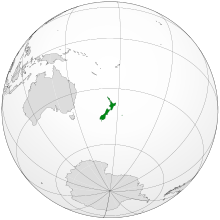Intersex rights in New Zealand
Intersex rights in New Zealand are protections and rights afforded to intersex people. Protection from discrimination is implied by the Human Rights Act and the Bill of Rights Act, but remains untested. The New Zealand Human Rights Commission states that there has seemingly been a "lack of political will to address issues involved in current practices of genital normalisation on intersex children".
In March 2017, New Zealand and Australian community organizations issued a joint call for legal reform, including the criminalization of deferrable intersex medical interventions on children, an end to legal classification of sex, and improved access to peer support.
Early common law, like canon law, held that hermaphrodites were to be treated as male or female depending on the prevailing sex.
In the early part of the 21st-century, the Human Rights Commission studied the circumstances of intersex people within the context of studies on the human rights situation of transgender people. Later work has examined the situation of intersex people separately, including the human rights implications of intersex medical interventions, shame and secrecy.
Notable civil society institutions and individuals include the Intersex Trust Aotearoa New Zealand, Mani Mitchell and refugee Eliana Rubashkyn. Mitchell narrated the documentary Intersexion in 2012.
In March 2017, representatives of Intersex Trust Aotearoa New Zealand participated in an Australian and Aotearoa/New Zealand consensus "Darlington Statement" by intersex community organizations and others. The statement calls for legal reform, including the criminalization of deferrable intersex medical interventions on children, an end to legal classification of sex, and improved access to peer support.
...
Wikipedia

